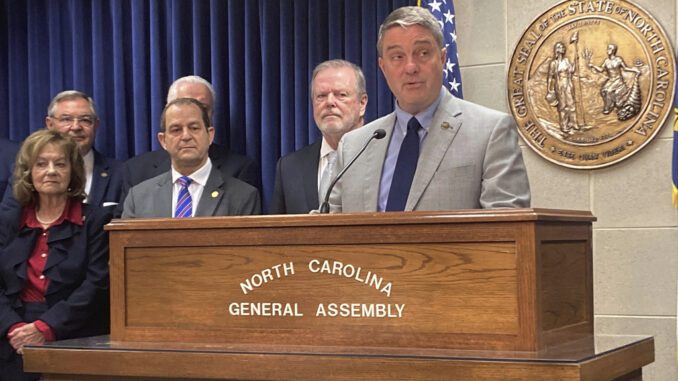
RALEIGH — Senate Leader Phil Berger (R-Eden), along with Senate Redistricting and Elections Committee Chairmen Sens. Warren Daniel (R-Burke) and Paul Newton (R-Cabarrus), introduced legislation aimed at reforming the structure of the State Board of Elections during a press conference on June 12.
“We are living in a time of intense political polarization,” Berger said. “Having a Board of Elections that is controlled by one party only sows distrust in our elections and we must find a new approach to quell concerns that cast doubt on the fairness of our elections.”
During the press conference, Berger cited a poll that showed only half of North Carolinians think elections will be free and fair.
“Just as one party shouldn’t have total control over appointments, one person shouldn’t be in charge of making those appointments,” Daniel said in a statement. “This proposal widens the pool of eligible board members and allows for all 170 members of the General Assembly to have a say in the appointment process. We want the best, most qualified appointees from across the state to serve on the board, and this proposal will accomplish that.”
Newton said that “We want a Board of Elections that can come to bipartisan compromise, instead of pushing partisan policy goals. Elections are critical to our democracy and any changes should be made by consensus.”
Senate Bill 749, titled No Partisan Advantage in Elections, would change the makeup of the State Board of Elections (NCSBE) to eight members up from five effective Jan. 1, 2025.
The appointment breakdown would be two members appointed by the President Pro Tempore of the Senate, two members appointed by the Speaker of the House of Representatives, two members appointed by the minority leader of the Senate, and two members appointed by the minority leader of the House of Representatives.
The members would be chosen by lawmakers from nominees provided by the two dominant political parties; however, the General Assembly would not have to necessarily choose from those lists and may pick from any registered voter in the state.
The General Assembly would fill vacancies based on a list of three nominees from the political party of the vacancy. But, again, the NCGA doesn’t have to pick one of those three names.
County boards of election will go from five members to four.
One county member will be appointed by the President Pro Tempore of the Senate, one member appointed by the Speaker of the House of Representatives, one member appointed by the minority leader of the Senate, and one member appointed by the minority leader of the House of Representatives.
Political parties will have the right to nominate 3 people but like with the NCSBE, the legislature does not have to pick from them.
Additionally, county chairs will have one-year terms and if a chair is not elected within 15 days from the date new members are appointed, the office can be filled by legislative appointment.
Another provision states the NCSBE chair would have to be elected in 30 days or else the NCGA does it for them. The same would apply to the executive director for the NCSBE.
In his remarks at the press conference, Berger referred to the “collusive settlement” entered into by the state’s attorney general in 2020.
“We don’t have to look too far back in our state’s history to see examples of the current State Board of Elections acting in a manner that injected suspicion into the election process during the 2020 elections,” Berger said. “You all will recall the state board, with the assistance of Democratic Attorney General Stein, entered into a collusive settlement with one of the democratic parties preferred attorneys to change state law regarding absentee ballots after the elections process had begun and people were actually voting.”
Berger added, “Their actions back in 2020 showed a willfulness to blatantly ignore state law in favor of pursuing ways to achieve a partisan policy,” and that those actions were “enabled by a board that circumvented the legislative process and caused North Carolinians to lose trust in the election process.”
“Now, we will take the necessary steps to begin rebuilding that trust,” Berger said.
Stein, NCSBE Executive Director Karen Brinson Bell, and Democrat go-to attorney Marc Elias, who represented a group of plaintiffs, arguably circumvented the legislature by entering into the 2020 settlement agreement that weakened absentee ballot laws related to accepting incomplete ballots or those missing witness signatures.
Collusive Settlements are addressed under Section 1.4 which deals with litigation and the section removes the governor as the approver for employing private counsel.
That section states “The Attorney General shall provide the State Board of Elections with legal assistance in [the] execution of its authority under this section or, in the Attorney General’s discretion, recommend that private counsel be employed. If the Attorney General recommends employment of private counsel, the State Board may employ counsel with the approval of the General Assembly.”
Emergency powers of the NCSBE executive director are also altered, giving those powers to the NCSBE instead in the event of a natural disaster, extremely inclement weather, or an armed conflict where forces are mobilized including the national guard.
Under the emergency powers section, “Under no circumstances shall the Executive Director or the State Board of Elections have the authority” to deliver absentee ballots to an eligible voter who did not submit a valid written request form for absentee ballots as provided statute, nor shall that position have the ability to “order an election to be conducted using all mail-in absentee ballots.”
North Carolina Democratic Gov. Roy Cooper tweeted a statement, calling the bill a “power grab.”
“The legislative Republican record is clear: Rig elections with gerrymandered districts, make it harder for people they disagree with to vote, and make it easier to throw those votes out,” Cooper tweeted. “Now they want to seize control of the State Board of Elections despite the Supreme Court repeatedly ruling that to be an unconstitutional power grab.”
“The last thing our democracy needs is for our elections to be run by people who want to rig them for partisan gain,” Cooper’s statement said in conclusion.
North Carolina Democratic Party Chair Anderson Clayton’s statement also cited “power grabs.”
“This is just the latest in a series of power grabs by far-right Republicans in the General Assembly,” Clayton said. “When the voters elected Governor Cooper twice, they did so with the expectation and desire that he would be making appointments to the Board of Elections—but we know the NCGOP’s playbook is to just change the rules instead of trying to win fair and square on the strength of their ideas.”
During the press conference, Berger responded to a reporter who asked if the bill was a “power grab,” by saying “I don’t see how anyone could use that terminology in a situation where we would be providing for half of the members of the board to be in each party.”
“What you described would be if the General Assembly or if Republicans were to replace the current situation and have Republicans having a majority on the board,” Berger said. “That is not what we’re doing here.”
Berger told reporters that he expects both Senate Bill 749 and another elections integrity bill, Senate Bill 747, to have a hearing in the Senate this week.



